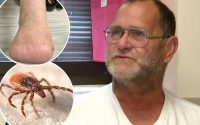My son has a brain tumor — a strange symptom led us to his diagnosis
A couple from England is warning other parents about the subtle signs of a brain tumor in children.
Parents Miriam and Colin Eckworth, noticed that their son, Zac, then 14 months old, had what looked like a “wobbling eye,” meaning that it was moving in an unusual way.
They took him to the doctor, where he was given an MRI and later diagnosed with optic nerve glioma, a brain tumor that grows slowly in or around the optic nerve that connects the eye to the brain, per Boston Children’s Hospital.
“This was a very difficult time for the family,” his mom, Miriam Eckworth, told South West News Service.
“It was hard for Zac, and it was hard for us to see him unable to be a child,” she continued.
After Zac’s diagnosis, he was referred to specialists in London, where doctors found the tumor to be benign.



Shortly after his diagnosis, his tumor was biopsied and was found to have a mutation called BRAF — V600E, which activates the MAPK signaling pathway — leading to cells dividing uncontrollably and tumor growth.
Still, he had to undergo many rounds of chemotherapy to treat the tumor, which is occasionally used on non-cancerous masses in an effort to shrink them, according to the United Kingdom’s National Health Services.
His tumor remained stable for nine months but then began to grow again.
As a result, he received more rounds of chemotherapy, until he was given the chance to try a trial of Dabrafenib, which is an anti-cancer drug to help treat those with the BRAF mutation in their tumor, per the National Cancer Institute.
It was approved in June 2022 for use in those six years of age or older.



Zac, who is now 11 years old, responded well to the drug and will remain on the medicine until he is a teenager.
“Zac has a good quality of life, which allows him to recover emotionally from what he experienced in his younger years,” his mom, Miriam, told SWNS.
As he goes off the drug in the coming years, doctors will monitor his tumor to see how it responds.
“Every day we feel blessed to have been given this life-changing treatment option,” his mom, Miriam, told SWNS. “It has given Zac the chance to live a relatively normal life.”
Although Zac is now visually impaired, he is able to live his life like any other kid his age, and doesn’t let the diagnosis hold him back — and he’s almost a black belt in karate.


“Zac is able to live a relatively normal life which allows him to have his own identity – this treatment has given him that, it has given us more quality time as a family,” Miriam said.
She added that the family was grateful to Professor Darren Hargrave, a specialist in pediatric neuro-oncology at London’s Great Ormond Street Hospital, where Zac was treated.
“We are incredibly grateful to Professor Hargrave and all of his work, and we are thankful for the research that means Zac can do so many of the things 11-year-old boys do,” she said.
Likewise, Professor Hargrave is passionate about his research, and stressed to SWNS that “kinder” treatments for children with brain tumors are a “priority.”
“The standard treatment for low-grade brain tumors can include multiple rounds of treatment – including surgery, chemotherapy and radiotherapy – for many years of their lives, and that often has profound long-term effects on their health,” he explained.
“We want our research to improve the lives of children diagnosed with a brain tumor, and the research we are going to carry out with this funding will enable us to do this.”
And, recently, the team who helped Zac was awarded over two million by The Brain Tumor Charity, an organization dedicated to learning about brain tumors, towards their own research of low-grade brain tumors.


